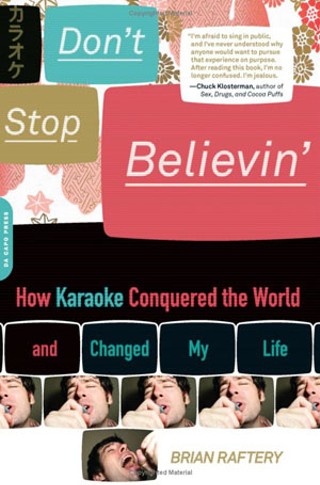Don't Stop Believin': How Karaoke Conquered the World and Changed My Life
When karaoke history and personal vignette collide
Reviewed by Kate X Messer, Fri., Dec. 26, 2008

Don't Stop Believin': How Karaoke Conquered the World and Changed My Life
by Brian RafteryDa Capo Press, 223 pp., $16 (paper)
"Conquered the world"?
I don't know about "conquered the world." Even I, admitted karaoke fanatic, drawn like moth to flame to those stanzas onscreen, would be hard-pressed to place it anywhere higher than halfway up the imaginary scale of cultural juggernauts: say, between the iPod and the Swiffer. Not that karaoke hasn't made inroads in hostile turf. Let's just agree that karaoke's warbling durability has definitely neutralized the sting of its detractors. Finally.
The breathless embellishment of his subtitle notwithstanding, Brian Raftery once and for all issues the last, perhaps unintentional salvo in the bizarro culture war between karaoke lovers and haters: "To make fun of karaoke now would be about as timely and relevant as making fun of Marilyn Quayle's pillbox hats."
No kidding. For years, those of us wooed by the power of the "empty orchestra" have had to endure the pithy snark of oppressive music purists and jerks in general who could never understand why anyone in her right mind would want (sometimes pay) to watch fellow marginally talented individuals work out 15-minutes-of-fame fantasies in rooms full of strangers. The perfect marriage of irony and sincerity. From its early beginnings in Asia to its eventual migration to the Western Hemisphere, karaoke has been a lonely road for many of its devotees. And while how-tos, explorations, and ethnographies of it do exist, no one has ever really charted karaoke's curious westward trend. Until now.
For the first time, someone has bothered to research the touchstones of the genre and gather them all in one place. Raftery traveled the K-boxes of the planet to track down a better understanding of the music and its various cultural contexts. As a karaoke chronology, Don't Stop Believin' is encyclopedic, rich with interviews and details usually reserved for more academic tomes. Raftery tracks down inadvertent karaoke inventor Daisuke Inoue, as well as the major players behind production giants such as Sound Choice and the Singing Machine and brave (or crazy) club owners who pioneered the trend in its most wincing early incarnations in California and New York. In the introduction, the author even demystifies a bit of karaokeana lore, that yes, the Eagles' Don Henley (among other artists) forbids the translation of his work into karaoke. "Clearly, Henley's famous '80s-era ponytail was merely the mop head on a stick lodged far up his butt."
Raftery's own memoirs are the threads that bind the nonlinear chronology together. Like karaoke itself, this first-person reckoning – often documenting carousing with his best friend and karaoke mentor, Mike – is at times insightful ("Much like the porn business, the karaoke business operates in the shadow of its more mainstream counterpart"), probing ("I never know what to do when 'nigga' comes on the screen"), and even occasionally painfully awkward ("I became so tipsily consumed with an old Phil Collins tune that she had to call the concierge, declaring a 'karaoke emergency' in our room").
The self-indulgence is built into the book's structure, as Raftery reveals big chunks of his life story throughout "Adventures in Karaoke," minichapters inserted between the history detailing personal relationships with songs, one song per chapter. Sometimes, however, his self-indulgence distracts. For example, he has a real chip on his shoulder about baby boomers, which makes his lame-ass Eighties-centric framing as annoying as it is ill-informed. (Dude, there was life before Alf.)
Despite the book's schizophrenic desire to be both history and personal vignette (and this book makes a case for a coffee-table-worthy volume, with pictures and lists: Brian, have your people call my people), Don't Stop is at its best when it goes deep. When Raftery goes behind the scenes to profile people such as the artist who translates the sweep to text on the screen or when he devotes an entire chapter to Pioneer's early karaoke videos (which were low-budget MTV knockoffs), these artifacts of karaoke culture do not simply exist in the book as winks and nudges to us karaoke insiders: These are full-body hugs, embraces ... validation.
In finding his holy karaoke grail, Raftery also comes away with a better understanding of himself ... or at least a certain peace with his rather twisted fascination. At the end of the book, Raftery includes two lists: "Fifty Songs I'll Never Stop Singing at Karaoke" and "Thirty Songs I'll Never Find at Karaoke," a knowing and generous gesture, as much is revealed by a karaoke-er's song selection. Most intimately, he shares with us the moment he reached his personal crossroads, right after a fairly gentle karaoke deflowering: "I'd spent the last few years being terrified of karaoke. What else had I been wrong about?"
Kate X Messer is, in addition to her various duties here at the Chronicle, the host of the paper's annual holiday party karaoke and occasional KJ around town when the mood suits. Her own karaoke lists are up on our blogs: The Gay Place Blog, www.austinchronicle.com/gayplaceblog, and Under the Covers, www.austinchronicle.com/underthecovers.












